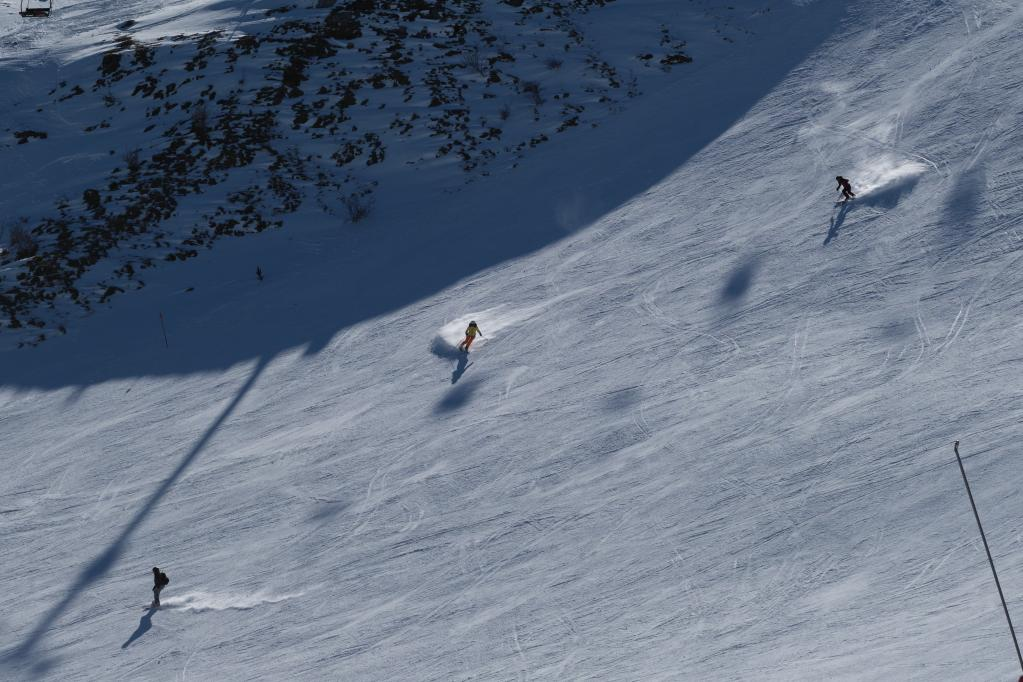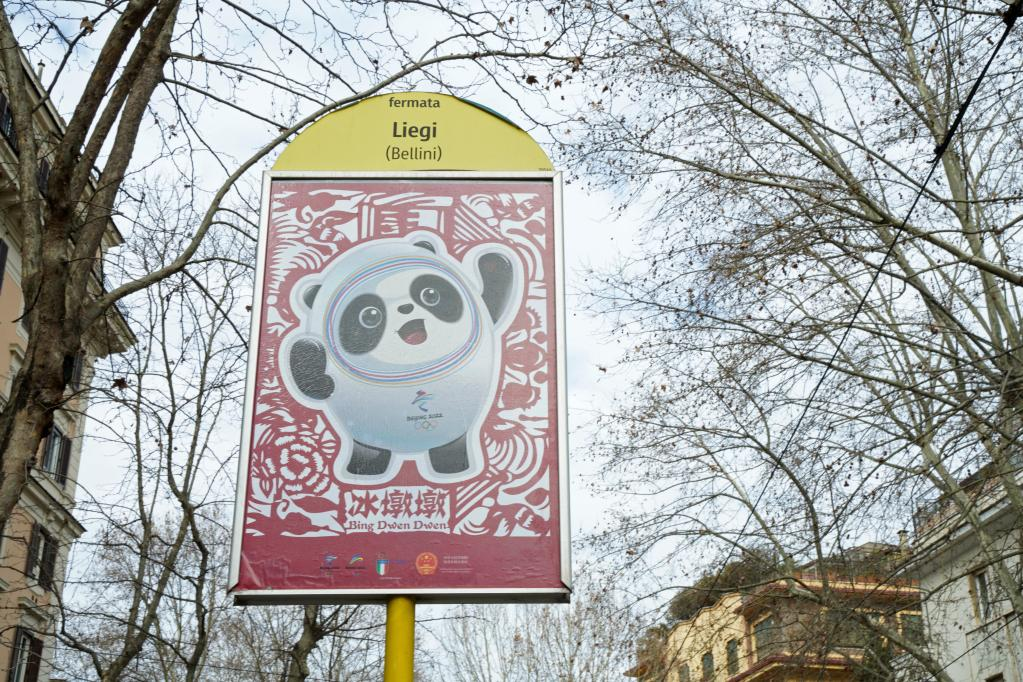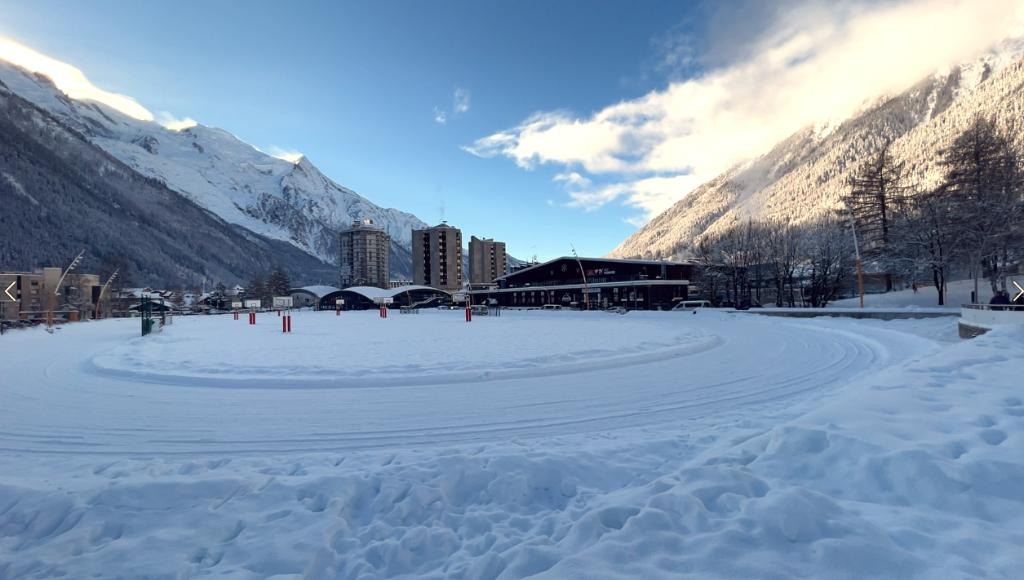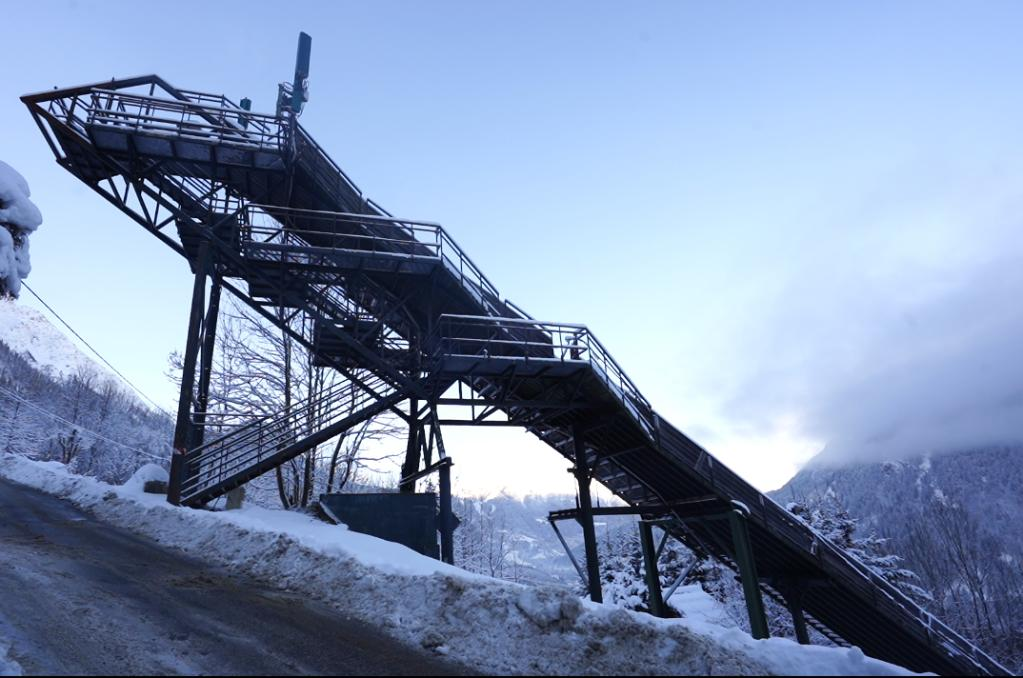
People ski in Astun, Spain, on Jan. 29, 2022. Hosting the Beijing 2022 Winter Olympics has advanced the Chinese people's understanding of the allure of ice and snow, and the grand event has been a catalyst for a booming winter sports economy in China and beyond. (Xinhua/Meng Dingbo)
ROME, Feb. 19 (Xinhua) -- Hosting the Beijing 2022 Winter Olympics has advanced the Chinese people's understanding of the allure of ice and snow, and the grand event has been a catalyst for a booming winter sports economy in China and beyond.
Even after the glare of this year's Winter Olympics subsides, European experts and business insiders expect a vast terrain ahead, saying China's further involvement in winter sports will inject fresh momentum into long-term cooperation between Europe and China.
SHOP WINDOW TO WORLD
The Olympic Games involves not only athletic competitions at the highest levels, but the competition between equipment makers behind the scenes. European makers of professional gear and equipment find their presence at the venues in Beijing a rewarding business.
Maurizio Tedesco, who works at the public relations department of Italian equipment maker Leitner, said that for companies like Leitner, the Olympics can be a "shop window to the world."
With a history of 134 years, Leitner is a major manufacturer of snow groomers, ski lifts, and funiculars. In 2019, it won a bidding process to supply a fleet of snow groomers for the Beijing Winter Olympics. Those vehicles are used on the slopes at the games.
"It is the best way to be seen as a high-quality supplier," Tedesco told Xinhua. "This is one of the reasons we work so hard to refine and develop our products."
Other Italian companies with important roles in the Beijing Winter Olympics include TechnoAlpin, which provides machines to make artificial snow, and iconic fashion brand Giorgio Armani, which produced the uniforms for the Italian team.
German company Schneestern participated in the design and build-up work of a snow Great Wall-shaped track for slopestyle events in Genting Snow Park at Zhangjiakou, as well as the Big Air Shougang in Beijing, the venue for the Big Air competitions.
"I'm still overwhelmed that we've made it this far with our sport," Dirk Scheumann, the company's founder and a former freeskier, told German newspaper Suddeutsche Zeitung in an interview.
BET ON CHINESE MARKET
As more Chinese are taking to the slopes, European nations see ample opportunities to attract mass tourists and winter sports enthusiasts to their renowned ski resorts, especially after the COVID-19 pandemic's heavy blow on tourism worldwide.
Chamonix-Mont-Blanc in southeastern France was the site of the first Winter Olympic Games in 1924. The economy of the commune heavily relies on winter tourism.
"Tourism is the major economic activity in the Chamonix Valley," Nicolas Durochat, director of the valley's tourist office, told Xinhua, adding that nearly 45 percent of their customers are foreigners.
"The Winter Olympics is an absolute catalyst for the sports," and the number of Chinese people that came there to ski grew obviously in recent years, said Durochat. "I'm sure it's just a beginning, when the health crisis is over and the traveling restrictions are lifted, more Chinese people will come here to ski."
The pandemic has hit the Swiss tourism industry hard, said Simon Bosshart, head of Markets East at Switzerland Tourism.
"The business came to a standstill. We are at roughly 2 percent of the business that we had in 2019 ... Our team has been grounded for two years now and many events have simply not been possible to execute," Bosshart said.
Bosshart said the Beijing 2022 Winter Olympics had opened up massive business opportunities for the landlocked, mountainous country.
"The need is there, and we absolutely believe in this potential in the future," Bosshart said.
NOT AN END POINT
Chinese people's Olympics-stirred enthusiasm for the excitement on snow and ice is not a short-lived craze, but will drive long-term growth of the winter sports industry, European businesses and observers noted.
According to China's National Bureau of Statistics, 346 million Chinese, almost a quarter of the country's population, had participated in ice-and-snow sports as of October 2021.
Trips related to ice and snow tourism are forecast to reach 305 million during the 2021-2022 ice-snow tourism season, according to a recent report issued by the China Tourism Academy (CTA) and Mafengwo, a travel service and social networking platform.
Ice-snow tourism will become a major driver of China's winter tourism and ice-snow economy, with its total income expected to surpass 1.1 trillion yuan (157.8 billion U.S. dollars) by 2025, according to the CTA.
"We believe that even beyond the Olympics, the growth trend in winter sports in China will continue," Christian Gut, chief sales and marketing officer at Stockli Swiss Sports, told Xinhua.
"In recent years, we have seen massive investments in the Chinese market, in the country's ski resorts," said the executive of the leading Swiss producer of skis. "China has the potential to become one of the world's biggest markets in the coming years."
European nations are eyeing close cooperation with China in winter sports industry.
Bosshart said that Switzerland Tourism will focus on four areas in China: the snow sports communities and influencers, cooperation with the winter sports industry such as ski resorts and fitness centers, classical tour operations and packages, and media promotion.
The Beijing Winter Olympics also offer inspirations to future Olympic bids. "Beijing 2022 is a good example of coexistence between emerging and classic sports," said Spanish sports newspaper Diario AS. "This new world has allowed countries with less tradition, such as Spain, to fight for challenges that were previously distant."
Hermann Winkler, co-founder of Snow 51 ski training company, noted that China has a relatively young history for many winter sports, but the market is fast growing and highly dynamic, and has the potential to double the global winter sports market and its community.
"China will soon be a leading nation in winter sports, perhaps not rapidly in terms of overall medal tally, but in terms of participants and global influence. The Beijing 2022 Winter Olympics is a starting point, not an end point," he said. ■

Photo taken on Jan. 29, 2022 shows a souvenir shop in Jaca, Spain. Hosting the Beijing 2022 Winter Olympics has advanced the Chinese people's understanding of the allure of ice and snow, and the grand event has been a catalyst for a booming winter sports economy in China and beyond. (Xinhua/Meng Dingbo)

People look into the window of a ski equipment shop in Jaca, Spain, on Jan. 29, 2022. Hosting the Beijing 2022 Winter Olympics has advanced the Chinese people's understanding of the allure of ice and snow, and the grand event has been a catalyst for a booming winter sports economy in China and beyond. (Xinhua/Meng Dingbo)

A tram stop board showing Bing Dwen Dwen, the mascot for the Beijing 2022 Olympic Winter Games, is seen in Rome, Italy, on Feb. 16, 2022. Hosting the Beijing 2022 Winter Olympics has advanced the Chinese people's understanding of the allure of ice and snow, and the grand event has been a catalyst for a booming winter sports economy in China and beyond. (Xinhua/Jin Mamengni)

Photo taken on Dec. 20, 2021 shows Nicolas Durochat, director of the Chamonix Valley's tourist office, in Chamonix-Mont-Blanc, France. Hosting the Beijing 2022 Winter Olympics has advanced the Chinese people's understanding of the allure of ice and snow, and the grand event has been a catalyst for a booming winter sports economy in China and beyond. (Xinhua/Xiao Yazhuo)

A tram stop board showing Bing Dwen Dwen, the mascot for the Beijing 2022 Olympic Winter Games, is seen in Rome, Italy, on Feb. 16, 2022. Hosting the Beijing 2022 Winter Olympics has advanced the Chinese people's understanding of the allure of ice and snow, and the grand event has been a catalyst for a booming winter sports economy in China and beyond. (Xinhua/Jin Mamengni)

Photo taken on Dec. 20, 2021 shows a site of the first Winter Olympic Games in 1924 in Chamonix-Mont-Blanc, France. Hosting the Beijing 2022 Winter Olympics has advanced the Chinese people's understanding of the allure of ice and snow, and the grand event has been a catalyst for a booming winter sports economy in China and beyond. (Xinhua/Xiao Yazhuo)

Photo taken on Dec. 20, 2021 shows a site of the first Winter Olympic Games in 1924 in Chamonix-Mont-Blanc, France. Hosting the Beijing 2022 Winter Olympics has advanced the Chinese people's understanding of the allure of ice and snow, and the grand event has been a catalyst for a booming winter sports economy in China and beyond. (Xinhua/Xiao Yazhuo)
